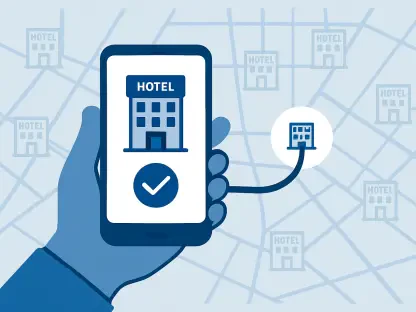In the fast-paced world of event planning, where every detail counts and attendee expectations continue to rise, selecting the right technology platform can make or break an event’s success. With countless options available, event organizers often grapple with fragmented systems, inadequate support, and tools that fail to scale with their ambitions. The challenge lies in finding a solution that not only streamlines operations but also elevates the experience for everyone involved. This pressing need for efficiency and engagement has driven the industry to prioritize platforms that deliver on multiple fronts, from adaptability to personalization. By focusing on key indicators of a robust event tech solution, planners can confidently navigate this complex landscape and ensure their events stand out in a crowded market.
Unlocking Efficiency with the Right Technology
Adapting to Any Event Size with Ease
A hallmark of a superior event tech platform is its ability to grow alongside the needs of an event, whether it’s a small local workshop or a sprawling international conference with thousands of attendees. This scalability means organizers can activate only the features they require, such as registration tools or exhibitor management, without paying for unnecessary extras. Such flexibility eliminates the hassle of switching systems as event demands evolve, saving time and resources. Moreover, a platform that adjusts effortlessly ensures consistency in operations, allowing teams to focus on creating impactful experiences rather than wrestling with technical limitations. This adaptability is not just a convenience but a strategic advantage in managing diverse portfolios.
Beyond mere flexibility, scalable platforms empower organizers to handle sudden changes, like a surge in registrations or an unexpected shift to a hybrid format. The ability to toggle features on or off without disrupting workflows is invaluable, especially during high-pressure planning phases. For instance, a platform that supports both in-person and virtual attendees through a single interface can simplify logistics significantly. This kind of responsiveness builds confidence among planners, ensuring they are equipped to tackle events of any magnitude without fear of outgrowing their technology. Ultimately, this scalability fosters long-term partnerships between organizers and their chosen solutions.
Streamlining Operations Through Integration
Another critical indicator of an effective platform is its capacity to integrate seamlessly with existing tools like customer relationship management systems, marketing automation software, and payment gateways. Pre-built integrations and accessible APIs are essential to avoid cumbersome setup processes that can delay event timelines. When a platform connects effortlessly with other systems, it enhances workflow efficiency by eliminating the need for manual data transfers or redundant processes. This cohesion allows teams to maintain a unified approach to event management, ensuring data flows smoothly across all touchpoints.
Equally important is how integration reduces the learning curve for staff who are already familiar with certain tools. A platform that complements rather than competes with current systems minimizes disruptions and boosts productivity from day one. For example, syncing attendee data with marketing tools can enable targeted campaigns without requiring additional effort. This interconnectedness not only saves time but also reduces the risk of errors that often arise from disjointed systems. By prioritizing integration, a platform proves its worth as a true partner in streamlining complex event operations.
Enhancing Experiences for All Stakeholders
Tailoring Interactions for Maximum Impact
Personalization stands as a defining feature of a top-tier event tech platform, delivering benefits to both organizers and attendees in unique ways. For planners, intuitive tools like drag-and-drop form builders and event cloning capabilities simplify setup processes, even for those without deep technical skills. Meanwhile, attendees enjoy customized experiences through features such as AI-driven matchmaking for networking or targeted messaging based on their interests. This dual focus on usability and engagement ensures that every interaction feels relevant and purposeful, elevating the overall event quality.
Further exploring this aspect, personalization also allows for dynamic adjustments during an event, responding to real-time feedback or shifting attendee behaviors. A platform that enables organizers to tweak schedules, send personalized notifications, or curate content on the fly demonstrates a commitment to user-centric design. Such adaptability can transform a standard event into a memorable one by addressing individual needs as they arise. Attendees, in turn, feel valued when their preferences are acknowledged, fostering loyalty and encouraging future participation. This tailored approach is a powerful tool for building lasting connections.
Maintaining Brand Identity Across Touchpoints
Control over branding is another essential element that distinguishes an exceptional event tech solution from a mediocre one. The ability to customize websites, mobile apps, badges, and virtual booths ensures that every attendee interaction reflects the organizer’s corporate identity rather than a generic template. This consistency in visual and messaging elements helps create a cohesive and professional impression, reinforcing brand recognition among participants. A platform that offers such customization options proves its understanding of the importance of identity in event success.
Additionally, strong branding control extends beyond aesthetics to influence how attendees perceive and remember an event. When every detail aligns with the organizer’s vision—from email communications to on-site signage—it builds trust and credibility. A platform that restricts customization risks diluting this impact, leaving events feeling disconnected from their intended message. By contrast, one that prioritizes branding flexibility empowers organizers to craft experiences that resonate deeply with their audience, ensuring the event leaves a lasting mark in their minds.
Building Trust with Reliable Support
The value of responsive, partnership-oriented support cannot be overstated when evaluating event tech platforms. During critical moments, especially live events, having access to swift issue resolution can prevent minor glitches from escalating into major disruptions. A platform backed by dedicated account managers who offer proactive assistance—rather than leaving organizers to navigate endless support queues—demonstrates a commitment to success. This level of care transforms the relationship from a mere transaction to a genuine collaboration.
Moreover, reliable support often includes resources like training materials or on-demand tutorials, enabling teams to maximize the platform’s potential independently. When challenges do arise, knowing that a knowledgeable team is just a call away provides peace of mind, particularly during high-stakes events. This reliability was evident in past implementations where timely interventions by support staff salvaged situations that could have derailed attendee experiences. Reflecting on those instances, it’s clear that exceptional support was a cornerstone of operational triumph, ensuring events unfolded smoothly despite unexpected hurdles.
Reflecting on Transformative Tech Choices
Looking back, the journey of countless event planners revealed that the right technology was pivotal in turning logistical challenges into seamless successes. Platforms that adapted to varying event scales, integrated effortlessly with existing tools, and prioritized personalization and branding left an indelible mark on outcomes. Perhaps most crucially, the presence of steadfast support during critical moments often made the difference between frustration and triumph. As the event landscape continues to evolve, organizers are encouraged to evaluate their current solutions against these benchmarks, seeking alternatives if gaps emerge. By investing in platforms that align with these proven criteria, planners can position themselves to not only meet but exceed expectations, crafting experiences that resonate long after the event concludes.









